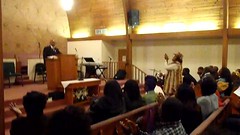 Roger Budd III read a speech about socialism and communism
and government oppression.
He didn’t like not being able to build a restaurant
because he hadn’t yet been able to get a building permit.
Hm, I guess he wouldn’t like the city paying for
making videos of its meetings available to the public,
like me and my socialist buddy Dan Davis suggested.
Roger Budd III read a speech about socialism and communism
and government oppression.
He didn’t like not being able to build a restaurant
because he hadn’t yet been able to get a building permit.
Hm, I guess he wouldn’t like the city paying for
making videos of its meetings available to the public,
like me and my socialist buddy Dan Davis suggested.
Here’s the video:
He didn’t like it —Roger Budd III @ VCC 21 April 2011
Regular monthly meeting of the Valdosta City Council (VCC),
Valdosta, Lowndes County, Georgia, 21 April 2011,
Videos by George Boston Rhynes for LAKE, the Lowndes Area Knowledge Exchange.
-jsq







